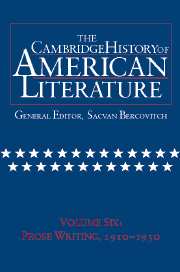Book contents
- Frontmatter
- Introduction
- A Cultural History of the Modern American Novel: Introduction
- 1 A Dream City, Lyric Years, and a Great War
- 2 Fiction in a Tme of Plenty
- 3 The Fate of Writing During the Great Depression
- Fictions of the Harlem Renaissance
- 1 A New Negro?
- 2 Black Manhattan
- 3 Avatars and Manifestos
- 4 Harlem as A State of Mind: Hughes, McKay, Toomer
- 5 A New Negro, A New Woman: Larsen, Fauset, Bonner
- 6 “Dark - Skinned Selves Without Fear or Shame”: Thurman and Nugent
- 7 Genre in The Renaissance: Fisher, Schuyler, Cullen, White, Bontemps
- 8 Southern Daughter, Native Son: Hurston and Wright
- 9 Black Modernism
- Ethnic Modernism
- Chronology
- Bibliography
- Index
4 - Harlem as A State of Mind: Hughes, McKay, Toomer
from Fictions of the Harlem Renaissance
Published online by Cambridge University Press: 28 March 2008
- Frontmatter
- Introduction
- A Cultural History of the Modern American Novel: Introduction
- 1 A Dream City, Lyric Years, and a Great War
- 2 Fiction in a Tme of Plenty
- 3 The Fate of Writing During the Great Depression
- Fictions of the Harlem Renaissance
- 1 A New Negro?
- 2 Black Manhattan
- 3 Avatars and Manifestos
- 4 Harlem as A State of Mind: Hughes, McKay, Toomer
- 5 A New Negro, A New Woman: Larsen, Fauset, Bonner
- 6 “Dark - Skinned Selves Without Fear or Shame”: Thurman and Nugent
- 7 Genre in The Renaissance: Fisher, Schuyler, Cullen, White, Bontemps
- 8 Southern Daughter, Native Son: Hurston and Wright
- 9 Black Modernism
- Ethnic Modernism
- Chronology
- Bibliography
- Index
Summary
Langston Hughes, life-long friend and fan of Carl Van Vechten, captured the inner black world to which his well-off friend desired entry. Born in 1902 into rural poverty, the internationally renowned Hughes counted in his large œuvre short stories, novels, plays, operas, two memoirs, and children’s books, as well as edited and translated volumes. Hughes may be the one New Negro author who honestly could list his occupation as “writer.” He began his ascent to fame when Jessie Fauset published the nineteen-year-old poet’s “The Negro Speaks of Rivers” in the June 1921 Crisis. Before the decade ended, Hughes brought out two much-reviewed collections of poetry, The Weary Blues (1926) and Fine Clothes to the Jew (1927). Rich in vernacular speech, humor, and musical influence, Hughes’s poems reveal his empathy with the average man and woman and his love for, and pride in, African American culture. Lines like “Night coming tenderly/Black like me” have fairly earned Hughes his reputation as the bard of black America. The swinging meter evident in much of his verse – “Droning a drowsy syncopated tune,/Rocking back and forth to a mellow croon,/I heard a Negro play...” – trumpets his fusion of black literature and music, drawing on both the rhythms and the images of blues and jazz to create a singularly American poetry. Innovative in form in ways that much other work of the period could not approach, Hughes’s poetic amalgam of black music and vernacular earns him a high place in the pantheon of American poets.
- Type
- Chapter
- Information
- The Cambridge History of American Literature , pp. 306 - 316Publisher: Cambridge University PressPrint publication year: 2002



